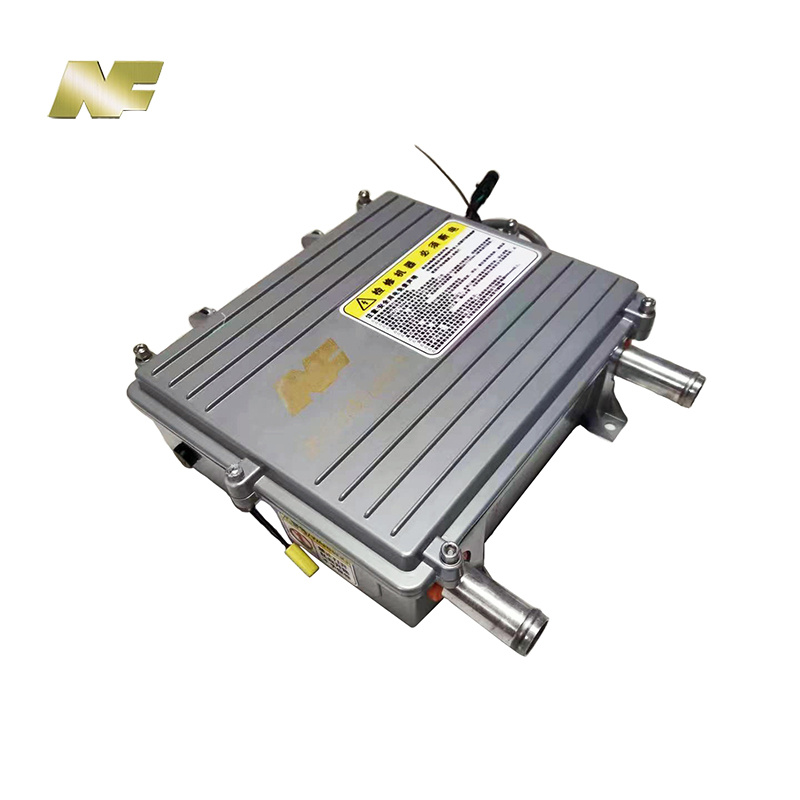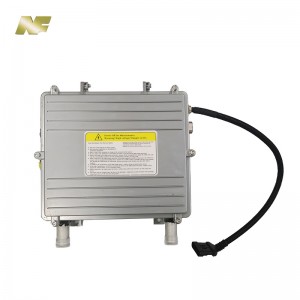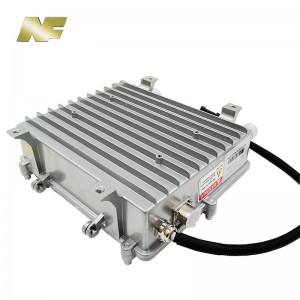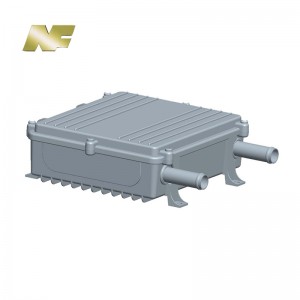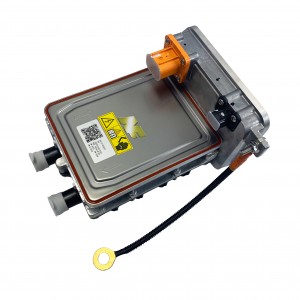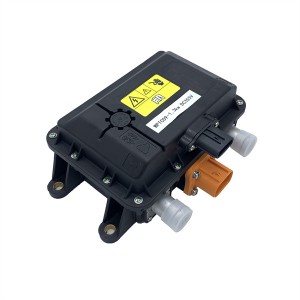NF 30KW DC24V High Voltage Coolant Heater DC400V-DC800V HV Coolant Heater DC600V
Description
With the increasing popularity of electric vehicles (EVs), the need for efficient heating systems continues to increase. Traditional heating systems in vehicles rely on internal combustion engines, which generate excess heat that can be used to heat the cabin. However, in electric vehicles, this option is not available, so alternative heating solutions need to be developed. In recent years, PTC (Positive Temperature Coefficient) heating systems have received a lot of attention in the electric vehicle and automotive industry due to their advantages.
PTC heating systems utilize PTC heaters, which are devices that generate heat when electrical current is passed through them. These heaters consist of PTC ceramic elements, which have a high resistivity, which means that their electrical resistance increases significantly with increasing temperature. This unique characteristic allows PTC heaters to self-regulate temperature, making them extremely safe and reliable for applications in electric vehicles and the automotive industry.
One of the main reasons for the growing popularity of PTC heating systems is their energy efficiency. Conventional heating systems in vehicles can be very power-hungry, resulting in a significant reduction in the overall driving range of electric vehicles. On the other hand, PTC heaters consume less electricity and provide more targeted heating. By combining high-temperature materials and optimized design, the PTC heating system can quickly heat the cabin without excessively draining the vehicle battery.
In addition, PTC heating systems offer several advantages over conventional heating systems in terms of safety. In conventional heating systems, there is always a risk of leakage or combustion-related accidents, given the fuel and the involvement of the internal combustion engine. With PTC heating systems, this risk is significantly reduced as no flammable materials or combustion processes are involved. This feature makes PTC heating systems ideal for safety-critical electric vehicles.
PTC heating systems not only provide efficient heating, but also contribute to overall comfort in the vehicle. These systems distribute heat evenly throughout the cabin, ensuring all passengers experience the desired level of warmth. Additionally, the PTC heating system offers flexibility in temperature control, allowing users to adjust heat settings to their liking. For a more comfortable and enjoyable driving experience, even in the coldest weather conditions.
Another advantage of PTC heating systems is their compatibility with high voltage power supplies. Electric vehicles typically run on high-voltage battery systems, and PTC heating systems can easily integrate with these sources. This compatibility eliminates the need for additional power converters or transformers, simplifying overall design and reducing cost. In addition, the use of a high-pressure PTC heating system enables faster heating rates, ensuring fast and efficient warming up of the cabin.
In summary, PTC heating systems are revolutionizing the electric vehicle and automotive industry with their energy efficiency, safety features, comfort, and compatibility with high-voltage power supplies. As the demand for electric vehicles continues to grow, the need for reliable and efficient heating systems becomes even more important. With its unique features and advantages, the PTC heating system provides an ideal solution for electric vehicle cab heating. By exploiting the self-regulating properties of PTC heaters, these systems can provide rapid and targeted heating without unduly draining the vehicle's battery. With compatibility with high-voltage power supplies, PTC heating systems are expected to become the preferred heating solution for future electric vehicles.
Technical Parameter
| NO. | Product Description | Range | Unit |
| 1 | Power | 30KW@50L/min &40℃ | KW |
| 2 | Flow Resistance | <15 | KPA |
| 3 | Burst Pressure | 1.2 | MPA |
| 4 | Storage Temperature | -40~85 | ℃ |
| 5 | Operating Ambient Temperature | -40~85 | ℃ |
| 6 | Voltage Range (high Voltage) | 600(400~900) | V |
| 7 | Voltage Range (low Voltage) | 24(16-36) | V |
| 8 | Relative Humidity | 5~95% | % |
| 9 | Impulse Current | ≤ 55A (i.e. rated current) | A |
| 10 | Flow | 50L/min | |
| 11 | Leakage Current | 3850VDC/10mA/10s without breakdown, flashover, etc | mA |
| 12 | Insulation Resistance | 1000VDC/1000MΩ/10s | MΩ |
| 13 | Weight | <10 | KG |
| 14 | IP Protection | IP67 | |
| 15 | Dry Burning Resistance (heater) | >1000h | h |
| 16 | Power Regulation | regulation in steps | |
| 17 | Volume | 365*313*123 |
Product Detail
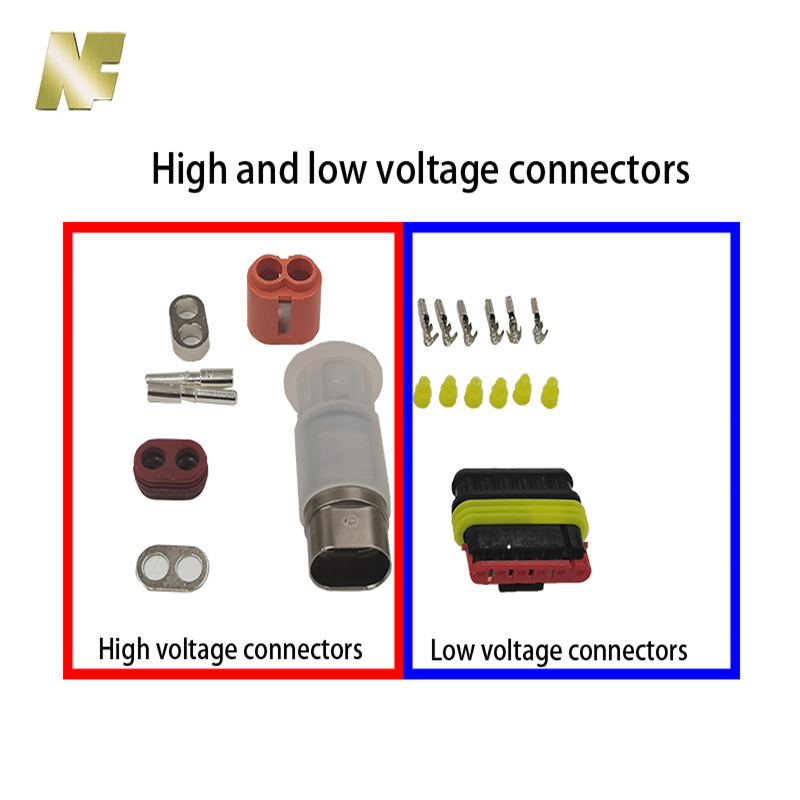
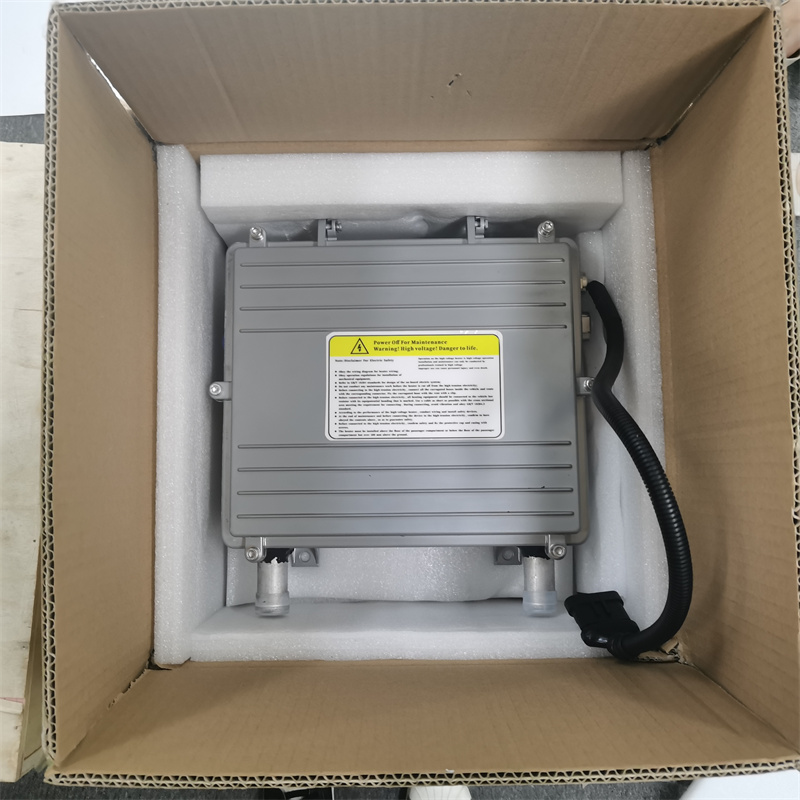
Advantage
Application

FAQ
Frequently Asked Questions About High Voltage Heaters in Automotive Applications
1. What is a high Voltage heater in automotive applications?
High pressure heaters are specially designed heating devices for electric and hybrid vehicles. It utilizes higher voltage systems (typically 200V to 800V) to provide efficient heating of the vehicle interior without relying on traditional engine-driven heating systems.
2. How does a high Voltage heater work?
High voltage heaters use electric heating elements powered by the vehicle's high voltage battery system. It converts electrical energy into heat, which is then transferred to the cabin through a heat exchanger, similar to a conventional heater core in a conventional vehicle. The heating output can be adjusted according to the desired temperature setting.
3. What are the advantages of high Voltage heaters?
High pressure heaters offer several advantages in automotive applications. They eliminate the need for the engine to idle to generate heat, reducing fuel consumption and emissions. They also provide instant heating, ensuring quick heating of the cabin in cold weather conditions. Additionally, the high-pressure heater is independent of the engine, making it suitable for electric and hybrid vehicles.
4. Can the high Voltage be used on all types of vehicles?
High voltage heaters are primarily designed for electric and hybrid vehicles with high voltage battery systems. They may not be suitable for conventional internal combustion engine vehicles, which do not have the necessary electrical infrastructure to support the high voltage operation of these heaters.
5. Are high Voltage heaters safe?
Yes, high pressure heaters are designed and built with safety in mind. They undergo rigorous testing to ensure compliance with safety standards and regulations. Additionally, they have safety features such as thermal fuses and insulation to prevent electrical failure and reduce the risk of electrical hazards.
6. How efficient is the high Voltage heater?
High pressure heaters are known for their high efficiency. They convert electricity into heat without major losses and are therefore very energy efficient. In addition, since they do not rely on engine heat, they can provide heat directly to the cab, reducing warm-up time and energy consumption.
7. Can the high Voltage heater be used in an extremely cold environment?
Yes, high pressure heaters are designed to operate effectively even in extremely cold environments. They are equipped with advanced controls and systems that ensure efficient heating even at low temperatures. It is worth noting, however, that heater range and efficiency may vary depending on ambient temperature and specific vehicle application.
8. What kind of maintenance does the high Voltage heater need?
High pressure heaters generally require minimal maintenance. However, regular inspections and repairs as recommended by the vehicle manufacturer are essential to ensure optimum performance. It is important to follow the maintenance schedule and guidelines provided by the vehicle manufacturer or authorized service center.
9. Can an existing vehicle be retrofitted with a high Voltage heater?
Retrofitting high-voltage heaters into existing vehicles can be challenging and may not be feasible due to the complex electrical infrastructure required to support their operation. These heaters are usually designed to be installed during vehicle manufacture. Retrofits should be performed by trained professionals with expertise in electrical systems, following the manufacturer's guidelines and recommendations.
10. Are high Voltage heaters more expensive than traditional heating systems?
The initial cost of a high-pressure heater can be higher compared to a conventional heating system in a vehicle with an internal combustion engine. However, their long-term benefits, such as reduced fuel consumption in hybrid and electric vehicles, can offset the initial investment. The cost-effectiveness of a high-pressure heater also depends on factors such as vehicle usage, climate, and energy prices in a particular region or country.

